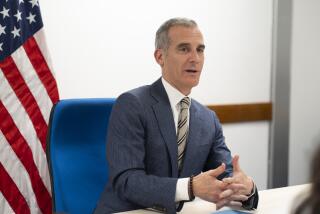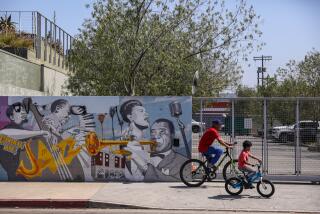In Mexico, L.A. Mayor Eric Garcetti’s Spanish goes far
MEXICO CITY — When historians write about 21st century Los Angeles, they’ll probably observe that Eric Garcetti was the second Spanish-speaking L.A. mayor in a row to make an official visit to the Mexican capital.
They may also note how trips such as his trade mission this week reflected the increasingly intimate cultural and economic ties between Los Angeles and its sister megalopolis to the south.
But some of the subtleties of the experience may be lost to posterity if it is not also noted that Garcetti, like his predecessor, Antonio Villaraigosa, speaks a version of the language that, for lack of a more scientific term, might be called Funky American Business Spanish.
Villaraigosa and Garcetti have Latino roots, but both had to learn much of their Spanish in school, on the stump or on the job. As a result, they speak a serviceable but far from perfect Spanish, a shortcoming each has acknowledged with humility and admirable good humor. During a 2009 visit to Mexico City, Villaraigosa referred to himself, self-deprecatingly, as “el pochito” — “pocho” being slang for an Americanized Mexican who may not speak Spanish well.
On Tuesday, Garcetti, whose paternal grandfather was born in Mexico, referred to his language skills as “good community meeting Spanish,” much of which, he said, was refined while he was representing L.A.’s heavily Spanish-speaking 13th City Council District.
It so happened that the Mexican press corps, fascinated by the new L.A. mayor with Mexican roots and an Italian name, was just as eager as his hometown constituents to chat him up.
“Yesterday I think I did 15 individual interviews” in Spanish, Garcetti said in an interview Tuesday morning. “At the end of the day, your head kind of hurts. But the next day, you’re speaking it again, and it hurts a little less.”
Garcetti’s Spanish probably served him well Tuesday afternoon in a closed-door meeting with Mexican President Enrique Peña Nieto, who was criticized by some during his 2012 campaign for speaking limited English.
At a news conference Monday at the Industrial Club of Mexico, the mayor ably fielded questions in Spanish, holding forth on the two cities’ shared challenges and his mixed Jewish-Latino heritage. His answers were also peppered with the kinds of little mistakes that his 11th-grade Spanish teacher at the private school now known as Harvard-Westlake, where he began studying the language, would have marked, lightly, in red pen.
At one point, he appeared to have invented a word: “agrecimiento,” to mean “acuerdo,” or “agreement.” Moments later, he stuck the English word “between” in the middle of a Spanish sentence. Later, making a reference to the “social fabric,” Garcetti said what sounded like the “fabrica social” (in Spanish, “el tejido social”), which could be translated as “the social manufacturing plant.”
If Garcetti had been speaking French on a diplomatic mission to Paris, he might have been harangued — or even hanged — for his errors. But Mexicans tend not to be such purists, and they have built up decades of tolerance for visitors from El Norte mangling their mother tongue.
“There’s no gotcha involved here,” Gil Cedillo, an L.A. City Councilman who is traveling with the mayor on the four-day trip, said in an interview Tuesday.
Cedillo should know: Though he grew up in Boyle Heights with Spanish-speaking parents, he said he started speaking the language seriously only after 1998, when he was elected to the California State Assembly and promised local Spanish-speaking media that he’d improve. Soon after, he said, he went to Cuernavaca for a two-week Spanish immersion crash course.
His parents, like many Latino parents at the time, saw the widespread prejudice against Spanish speakers and decided it best that their son assimilate.
“I know I’m limited,” he said. “I know my grammar is not correct. But I know people here appreciate the effort.”
After tossing a few questions at Garcetti in Spanish on Monday, Isaac Ajzen, a reporter for diariojudio.com, a website for Mexico’s Jewish community, said that Garcetti, despite an American accent, had acquitted himself well.
Garcetti’s Spanish “is pretty good, it’s pretty fluid,” Ajzen said. “Obviously, he’s lacking a few words.”
Cedillo has a theory about Mexicans’ high tolerance for wonky Spanish: “I think Mexicans appreciate the value of their relationship with the United States more than we do ours with Mexico.”
But for Los Angeles politicians, at least, acknowledging the importance of Mexico, and its language, has become increasingly de rigueur, for political and economic reasons.
Garcetti deployed Spanish often during last year’s mayoral race, emphasizing his Mexican heritage even as some well-known local Latino leaders rallied behind his opponent and at least one of them questioned Garcetti’s Latino roots. The strategy probably helped him carry most of the heavily Latino neighborhoods on L.A.’s Eastside in the May election.
Currying favor with Mexico on the business front also makes good sense. According to Garcetti’s office, Mexico is the L.A. metropolitan area’s second-largest export market, with trade between Los Angeles and the Mexican capital alone amounting to $2.2 billion in 2010. And the largest number of foreign tourists to L.A. are from Mexico.
The mayor, who arrived in Mexico City on Sunday, was joined by a group of L.A. city officials, whose $95,000 travel costs were picked up by Los Angeles World Airports and the Port of Los Angeles, according to the mayor’s office. A number of area business leaders came along and paid their own way.
They were hoping to expand flights and cruise-ship traffic between L.A. and Mexico, create new opportunities in construction, retail and green energy businesses, and let Mexicans to know about the planned “Harry Potter” and “Despicable Me” attractions at Universal Studios Hollywood.
On Monday, Garcetti visited the National Autonomous University of Mexico, celebrating its plans to partner with Cal State Northridge in creating a new Center for Mexico and Latin American Studies at the California school. On Wednesday, he was scheduled to inaugurate a new exchange program between Loyola Marymount University and the Autonomous Technological Institute of Mexico.
Garcetti spoke at a news conference about the importance of “cultural fluency” in the new global economy. “Mas y mas, este es una oportunidad de cruzar las fronteras,” he said — more and more, this is an opportunity to cross borders — “directamente, y, um, ah…”
“Say it in English,” Ajzen suggested in English, with a chuckle.
“OK, I’ll say it in English,” Garcetti said. “You can cross the borders literally and conceptually.”
More to Read
Sign up for Essential California
The most important California stories and recommendations in your inbox every morning.
You may occasionally receive promotional content from the Los Angeles Times.










